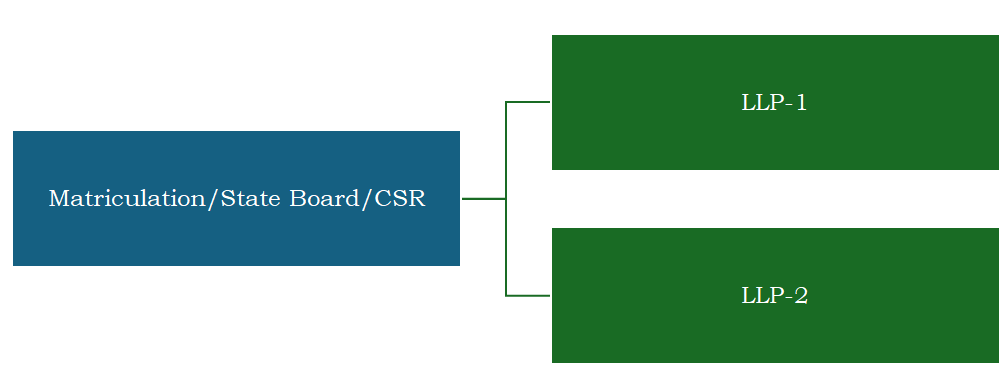Programmes
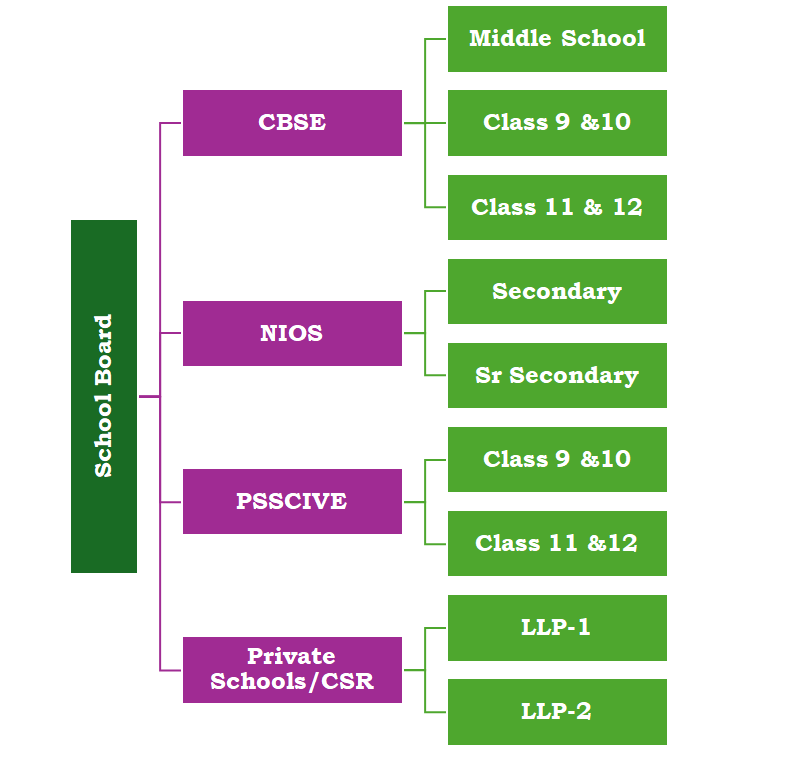
School Programme With CBSE
Objective––
- Introduction to the logistics industry.
- Students would be introduced to different types of sources and encouraged to reflect on them critically.
- Examining these sources allows students to identify patterns, make connections, and draw conclusions.
- These skills are not just theoretical but will prepare them for real-world challenges, instilling a sense of confidence in their abilities.
- Introducing timelines in game-based learning methods
- Introduce the global distribution of economic resources and the ongoing process of globalization.
Target Schools
- Pilot study to be introduced in selected states with Middle, Secondary and Higher Secondary Schools.
- The states' selection is based on where the activities and industry expertise are leading in logistics, Port-based (Air/Sea), Hub operation and E-commerce.
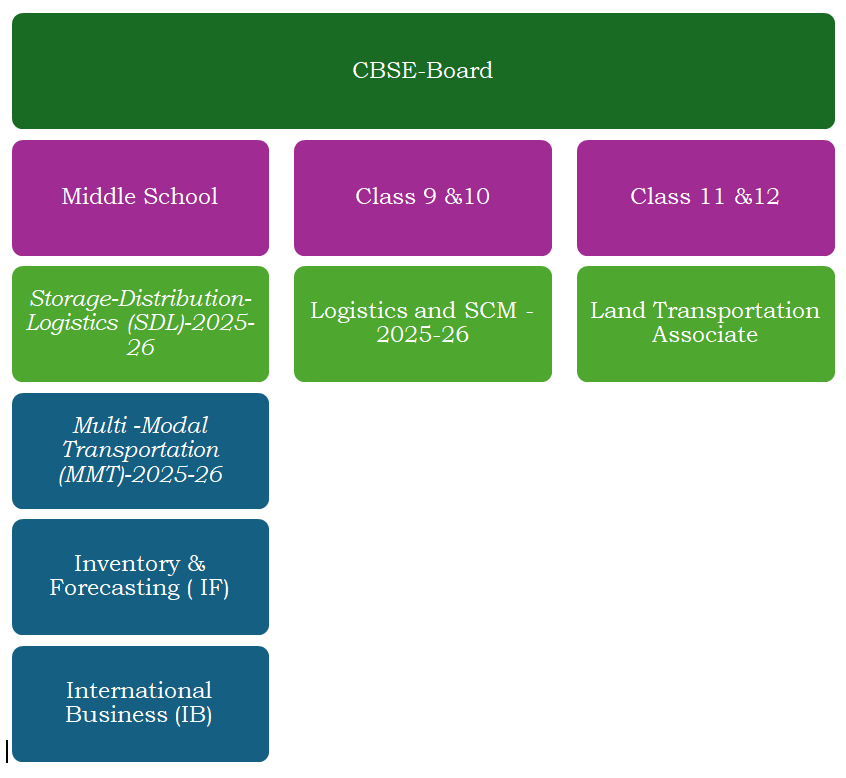
School Programme With NIOS
Project Details
Logistics SectorSkill Council(LSC) and NIOS signedan MoU to provide education opportunities to a wider range of audiences through LSC-affiliated Training Providers (TPs). Logistics Sector Skill Council (LSC) will facilitate onboarding Training centers, system enrolments, monitoring and subsequent support to the Training Partners to implement the NIOS courses.
About NIOS
The National Institute of Open Schooling (NIOS) was set up by the Ministry of Education, Government of India, as an autonomous organization in 1989 by amalgamating the Open School project of CBSE that was started in 1979. It was known as National Open School till 2002, when it was rechristened as NIOS. NIOS provides educational opportunities using distance and open learning methods to learners who wish to study and qualify for a better tomorrow.
Objectives
- Create a pool of trained professionals in logistics; enable baseline workers in the logistics sector to enhance their school education.
- Provide skill inputs for existing workers to enable upward mobility and
- Develop individuals' entrepreneurial skills.
Target Group
- Opportunity for Employees to complete their School Education-for Industry
- Opportunity to become NIOS-LSC approved Centre
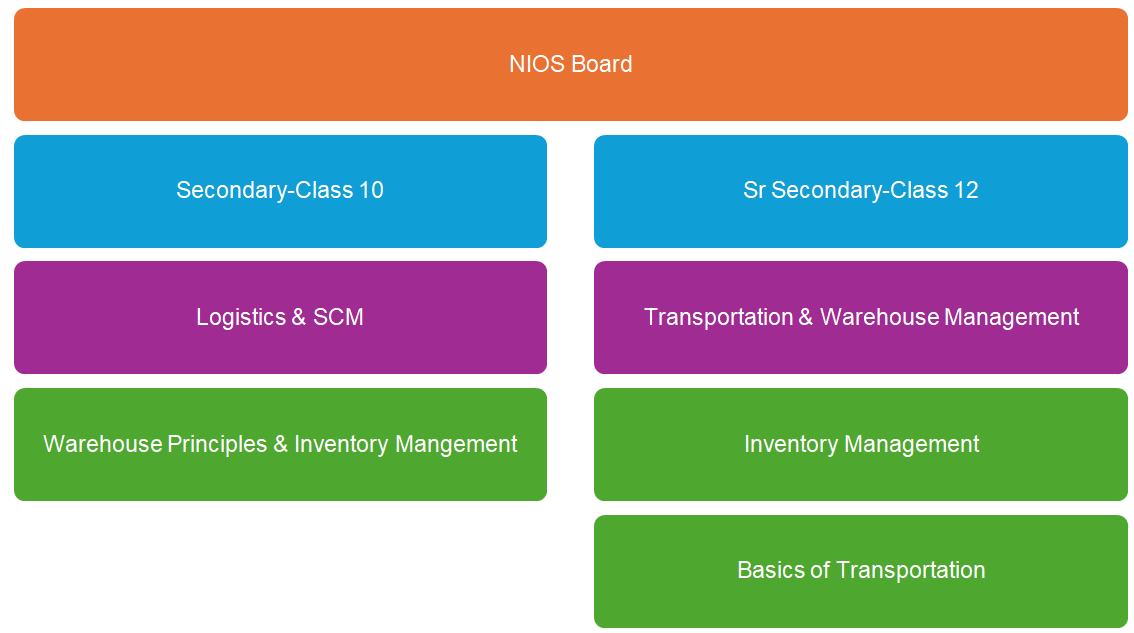
NIOS Pathway
|
Secondary Level |
Senior Secondary Level |
|
Group A |
Group A |
|
English |
English |
|
Hindi/Telugu/Tamil/Kanada/Bengali/ Punjabi |
|
|
Group B |
Group B |
|
Business Studies/Economics/Accountancy |
Business Studies/Data Operations |
|
|
Group C |
|
|
Basic of Transportation |
|
Logistics and Supply Chain Management |
Transportation &Warehouse Management |
|
Warehousing Principles & Inventory Management |
Inventory Management |
|
Eligibility Criteria |
|
|
Secondary Level |
Senior Secondary Level |
|
The minimum age for entry is 14 years. (or) Class 8th/9th pass (or) Class 10th pass (or) Class 10th fail (Self acknowledgement |
The minimum age for entry is 15 years. (or) Class 10th pass (or) Class 12th fail (or) Class 12 Pass for improvement |
Name of Accredited Centers
|
1 |
Imperial Institute of Technical Proficiency |
Dhalai, Tripura |
|
2 |
Rajendra Institute of Education and Social Welfare |
Sitamarhi, Bihar |
|
3 |
AISECT Azamgarh |
Azamgarh, Uttar Pradesh |
|
4 |
COLTE |
Chennai, Tamilnadu |
School Programme With PSSCIVE
About PSSCIVE
The Pandit Sunderlal Sharma Central Institute of Vocational Education (PSSCIVE) is an apex research and development organization in vocational education. It is a constituent unit of the National Council of Educational Research and Training (NCERT), established in 1993 by the Ministry of Education (MoE), Government of India. The Institute is also a UNEVOC (International Project on Technical and Vocational Education) Network Centre in India, which coordinates all the activities, including communication with the UNESCO-UNEVOC International Centre, Bonn, Germany.
Objectives
- Promote vocational education and training in logistics and sub-sectoral activities and enhance the country's socio-economic development.
- Enhance the quality of vocational education and training system
- Foster lifelong learning through the delivery of employability and 21st Century skills.
- Design and offer programmes for professional development of Vocational Teachers to enhance the quality of vocational education and training in school
Target Group
The state schools associated with PDDCIVE for building vocational education and training.
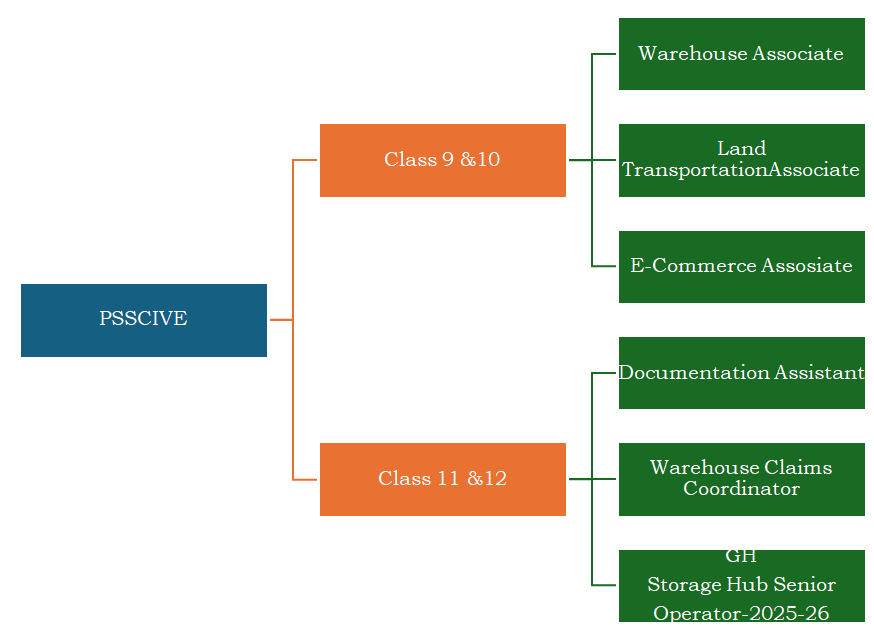
|
South Goa |
North Goa |
|||
|
1 |
Bethany Convent High School |
1 |
VD and SV Wagle High School |
|
|
2 |
Gomantak Vidyalaya High School, Government High School Ganjem and New Educational Institute |
2 |
Santa Cruz High School and Madkaikar Navchaitanya High School |
|
|
3 |
Marina English High School |
3 |
Government High School Bhuipal |
|
|
4 |
Government High School Ambaulim and Infant Jesus High School |
4 |
Shree Bagwati High School and Mandrem High School |
|
|
5 |
PM Shri Government High School, Mangor and Government High School New Vadem |
5 |
Harmal Panchakroshi High School |
School Programme -Logistics Literacy Programme
Logistics Literacy Programme (LLP)
LLP paves the way for students to enable young students on the verge of completing their school education to understand the availability of dream career opportunities in the Logistics Sector. Facilitate the students to choose an appropriate degree programme in Logistics to pursue after their school education. The Logistics Literacy Programme helps the participating students choose an appropriate Degree programme to join after their schooling.
Programme Outcome
The proposed programme has the following outcomes: -
- Enable the young students on the verge of completing their education to understand the availability of dream career opportunities in the Logistics Sector.
- Facilitate the students to choose an appropriate degree programme in Logistics to pursue after their school education.
- In the unfortunate event of dropping out from education, motivate students to take up Apprenticeships and later full-time employment in the industry. LSC will take responsibility for assisting Apprenticeship.
Curriculum:
Levels 1 and 2 of the Programme are meant for Std. VIII and Std IX. Each Level is designed for 75 hours, comprising theory- and computer-based gamification.
Implementation
The Programme would be implemented in districts with logistics activity or proximity to existing logistics hubs. LSC plans to implement the proposed programme in school from the ensuing current Academic Year.
